
July 6
1885 Birth: Ernst Busch, in Essen-Steele, Germany:
After being educated at Gross Lichterfelde Cadet Academy he joined the German Army in 1904 and during the First World War served on the Western Front where he fought at Arras and Verdun. In 1918 he won the Pour le Mérite for showing exceptional courage during battle. Busch remained in the army and in 1925 was appointed Inspector of Transport Troops and in 1930 was promoted to the rank of lieutenant colonel and placed in command of the 9th Infantry Regiment.
An ardent supporter of the Nazi Party, Busch achieved rapid promotion after Adolf Hitler came to power in 1933. Within two years he had been promoted to major general and was commander of the 23rd Infantry Division. In February 1938 Hitler appointed him general. Whereas most senior officers pleaded with Hitler to move with caution, Busch and fellow Nazi, Walther von Reichenau, urged him to invade Czechoslovakia.
Busch served under Siegmund List during the invasion of Poland in September 1939. The following year he led the 16th Army during the Western Offensive. On the 26th May, 1940, Hitler awarded him the Knight's Cross. Busch took part in Operation Barbarossa and on 8th September 1941 his 16th Army took Demyansk before taking part in the siege of Leningrad. Despite a counter-attack by the Red Army Busch's troops held the line from Staraya to Ostashkov. After a brave defence of his position he was promoted to field marshal.
In October 1943 Busch replaced General Gunther von Kluge as head of Army Group Centre. However, he only held the post until June 1944 when he was replaced by General Walther Model. Busch was recalled in March 1945 when he became head of Army Group Northwest. Along with Kurt Student and his 1st Parachute Army, Busch had the task of trying to halt the advance of General Bernard Montgomery and the Allies into Germany.
Ernst Busch, who surrendered on 3rd May, [1945, was] taken to Britain as a prisoner of war, and he died in captivity on 17th July 1945.
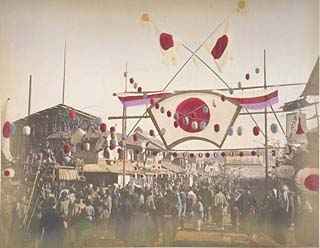
1887 Hawaii: The Constitution of the Kingdom of Hawaii is imposed on the Kingdom and its monarch, David Kalākaua. Those responsible are the armed militia of the Honolulu Rifles by direction of a secret society working for annexation to the United States, the Hawaiian League. Asians, including subjects who had previously enjoyed the right to vote, are now specifically denied suffrage simply on the basis of race. In the event, about 75% of ethnic Hawaiians will not be able to vote at all because of the gender, literacy, property, and age requirements. However, because of the racial disenfranchisement of Asians, ethnic Hawaiians will still amount to about two-thirds of the electorate for representatives and about one-third of the electorate for Nobles. (Kinzer)
[See: Countdown to Infamy: Timeline to Pearl Harbor.]1889 Birth: Hanns Eisler: German-Austrian-American composer during World War I:
Eisler was wounded several times in combat. In 1925 Eisler moved to Berlin. There, he identified closely with the Communist Party of Germany although he never joined. After 1933, Eisler's music and Brecht's poetry were banned by the Nazi Party...joined the generation of anti-Nazi exiles who sought refuge in the United States. In New York City, Eisler taught composition at the New School and wrote experimental chamber and documentary music. Eisler's promising career in the U.S. was interrupted by the Cold War. He was one of the first artists placed on the Hollywood blacklist by the movie studio bosses. In two interrogations by the House Committee on Un-American Activities, the composer was accused of being "the Karl Marx of music" and the chief Soviet agent in Hollywood. Eisler's supporters, including his friend, Charlie Chaplin, and the composers: Igor Stravinsky, Aaron Copland, and Leonard Bernstein, organized benefit concerts to raise money for his defense fund, but he was deported early in 1948.

1915 World War I: List Regiment: Gefreiter Adolf Hitler's 16 Reserve Infantry Regiment continues to occupy a position at Fromelles—pictured above in a drawing by Hitler—on a level field with water channels, willow trees and willow stalks; in the distance towards the enemy lines lies an insignificant wood with barbed wire entanglements. Under the direction of their defense-minded commander, Lieutenant General Gustav Scanzoni von Lichtenfels, the regiment works ceaselessly day and night to further fortify their position at Fromelles while fighting off repeated assaults by the enemy. [For further details, Click here.]
1916 World War I: List Regiment: Gefreiter Adolf Hitler endures trench warfare in Flanders (Artois) with 3 Company, 16 Reserve Infantry Regiment. [For further details, Click here.]
1917 World War I: Various:
List Regiment: Gefreiter Adolf Hitler's 16th RIR remain deployed for Phase 1 operations in Flanders, Belgium. [For further details, Click here.]
Matthias Erzberger—leader of the Catholic Center Party in the Reichstag—attacks the German High Commands conduct of the war. Erzberger bluntly states that the submarine campaign has failed, Germany's allies are collapsing, and the military situation is hopeless. Erzberger suggests that peace negotiations on the basis of no annexations should begin immediately.
1918 World War I: Czech troops take Russian port of Vladivostok for Allies:
When World War I broke out in the summer of 1914, the countries now known as the Czech Republic and Slovakia were part of the Austro-Hungarian Empire, now fighting with Germany against the Allies: Russia, France, and Great Britain. Czechs who enlisted in the Austro-Hungarian army found themselves fighting against their countrymen. Many Czechs had emigrated to Russia near the turn of the century, mostly settling in and around Kiev—the capital of Ukraine—and began to bristle under Austro-Hungarian rule and, in many cases, to surrender voluntarily to the Russian enemy. In 1917, Thomas Masaryk, a professor of philosophy, pan-Slavist and ardent Czech nationalist, began lobbying the Russian government to let him raise a full Czecho-Slovak army in Russia to fight against the Central Powers. After the abdication of Czar Nicholas II in March, the provisional government allowed Masaryk to go ahead with his plan, and the Czech Legion was formed.
Over the next year, however, the Russian war effort collapsed, amid crushing losses to Germany on the Eastern Front and inner turmoil—culminating in November—when the radical socialist Bolsheviks, led by Vladimir Lenin, seized power from the provisional government and almost immediately called for an armistice with the Central Powers. The Czech Legion, finding itself abandoned by its Russian comrades, decided to keep up the fight. Blocked by German forces from joining the other Allies on the Western Front in France, they headed east, coming into conflict with Bolshevik forces along the way.
By the summer of 1918, the Czech Legion had reached the Russian Pacific port of Vladivostok, where they overthrew the local Bolshevik administration on June 29. On July 6, the legion declared the port to be an Allied protectorate. That same day, U.S. President Woodrow Wilson lauded the Czecho-Slovak contribution to the war effort, suggesting that some 12,000 Japanese troops be dispatched to Vladivostok in order to relieve the Czech Legion and allow them to proceed to the battlefields of France, a suggestion the Japanese accepted . . . .
1919 A British Dirigible—the R-34—lands in New York at Roosevelt Field, completing the first crossing of the Atlantic Ocean by an Airship in 108 hrs.
1923 The Union of Soviet Socialist Republics is established:
During the 1920s, sweeping changes were made in governmental administration, and marked improvements were achieved in the internal economy and foreign affairs of the country. Up to the end of 1923, the territory which was controlled by the Soviet government comprised the Russian SFSR, the eastern halves of Belorussia and the Ukraine, and the Caucasus. A plan of federation was drawn up under Stalin's supervision, and in January 1924 a new constitution was promulgated, reorganizing the areas under Soviet control into the Union of Soviet Socialist Republics.
1933 Holocaust: Various:
Jewish lawyers in Germany are warned to stay away from the courts for 'their own protection':
According to the census of June 16, 1933, the Jewish population of Germany, including the Saar region (which at that time was still under the administration of the League of Nations), was approximately 505,000 people out of a total population of 67 million, or somewhat less than 0.75 percent. That number represented a reduction from the estimated 523,000 Jews living in Germany in January 1933; the decrease was due in part to emigration following the Nazi takeover in January. (An estimated 37,000 Jews emigrated from Germany during 1933.)
Jewish students attending German universities are limited to 1.5 percent of the total student body:
The Jews were a special target of Nazi ideology and policies, which ultimately resulted in the Holocaust, the systematic, state sponsored murder of almost 6 million European Jews. From the very first, Jews and their children suffered at the hands of the Nazis, and thus the world of Jewish children was rapidly restricted as soon as the Nazis came to power in Germany in January 1933.
1937 Holocaust: A German decree forbids Jews from studying medicine.
1938 Holocaust: The Law for the Alteration of Regulations of Industrial Enterprises prohibits numerous Jewish business activities in Germany. Jews can no longer operate real estate, information, loan, private security, marriage, brokerage, or administrative offices. They are even prohibited from serving as tour guides and are ordered to declare their assets and "sell" their businesses. (THP)
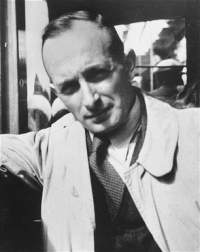
1939 Holocaust: Adolf Eichmann arrives in Prague to take charge of Jewish emigration.
1940 World War II: Various:
War at Sea: Off the coast of Norway, light units of the Kriegsmarine sink 5 British submarines, Narwhal, Salmon, Spearfish, Shark, and Thames.
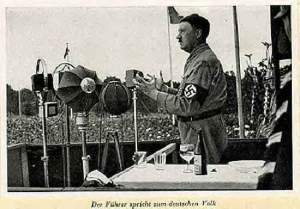
Hitler returns to Berlin: After spending 8 weeks in the West, a triumphant Hitler returns to Berlin where he is wildly cheered by the Berlin population.
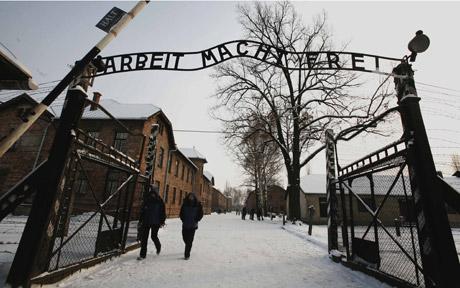
Holocaust: The first successful escape from Auschwitz is followed by a punitive 20-hour roll-call.
1941 World War II: Various:
Joseph Goebbels speaks on the German invasion of the USSR:
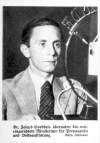
We know that Mr. Churchill and his cowardly but well-paid journalists will trivialize or ignore our proofs. He sees what he wants to see, and does not see what fails to please him. But that will not hinder us from making our charges before the world. The war that we are waging against Bolshevism is a war of moral humanity against spiritual rottenness, against the decline of public morals, against spiritual and physical terror, against criminal policies whose makers sit on mountains of corpses in order to see whom their next victim will be.
Barbarossa: Heeresgruppe Nord continues its advance, reaching a line from Lake Peipus through Reval to Parun N of the Gulf of Riga.
North Africa: In Libya, Axis aircraft bomb Tobruk and Sidi Barrani.
[See: The Mediterranean Strategy.]1942 World War II: Various:

FDR to Stalin:
The Egyptian crisis which is threatening the supply route to the Union of Soviet Socialist Republics has caused Prime Minister Churchill to direct me to an urgent inquiry whether forty A-20 bombers which are now in Iraq en route to the Union of Soviet Socialist Republics can be transferred to the Egyptian front. Because of limited information here, it is impossible for me to express judgement on this matter. For this reason I thought it better to request you to make a decision, taking into consideration the interests of the war effort of the United Nations as a whole.
Holocaust: Frank family takes refuge:

In Nazi-occupied Holland, 13-year-old Jewish diarist Anne Frank and her family are forced to take refuge in a secret sealed-off area of an Amsterdam warehouse. The day before, Anne's older sister, Margot, had received a call-up notice to be deported to a Nazi 'work camp.'
Born in Germany on June 12, 1929, Anne Frank fled to Amsterdam with her family in 1933 to escape Nazi persecution. In the summer of 1942, with the German occupation of Holland underway, 12-year-old Anne began a diary relating her everyday experiences, her relationship with her family and friends, and observations about the increasingly dangerous world around her. On July 6, fearing deportation to a Nazi concentration camp, the Frank family took shelter in a factory run by Christian friends. During the next two years, under the threat of murder by the Nazi officers patrolling just outside the warehouse, Anne kept a diary that is marked by poignancy, humor, and insight.
On August 4, 1944, just two months after the successful Allied landing at Normandy, the Nazi Gestapo discovered the Frank's "Secret Annex." The Franks were sent to the Nazi death camps along with two of the Christians who had helped shelter them, and another Jewish family and a single Jewish man with whom they had shared the hiding place.
North Africa: The Afrikakorps is holding on to its positions before El Alamein against continuous attacks by the British Eighth Army.
War at Sea: U-132 enters the Gulf of St. Lawrence on the Canadian east coast and sinks 3 merchant ships:
In the early stages of the war, the U-boats were extremely effective in destroying Allied shipping, ranging from the Atlantic coast of the United States and Canada to the Gulf of Mexico, and from the Arctic to the west and southern African coasts and even as far east as Penang. It is even rumored that one German U-boat managed to make it all the way down to Galveston Bay, Texas. Because speed and range were severely limited underwater while running on battery power, U-boats were required to spend most of their time surfaced running on diesel engines, diving only when attacked or for rare daytime torpedo strikes. The most common U-boat attack during the early years of the war was conducted on the surface andat night.
1943 World War II: Operation Citadel: The battle of Kursk continues with unabated ferocity. While the northern pincer of 9th Armee (Model) is struggling to make any significant progress, the southern pincer of 4th Panzerarmee (Hoth) advances some 12 miles, with both sides incurring heavy casualties:
Stalin was intent on attacking the Germans in a pre-emptive strike but General Zhukov insisted on letting the Germans attack first and wearing themselves down on the defenses he had planned. These defenses were of a scale never seen before for a battle and the Russians immediately put the military and 300,000 of the local civilian population to work laying a massive array of tank traps, minefields, anti-tank guns and dug in tanks and other defensive positions in anticipation of the German attack. The minefields were specially designed to channel the armored formations into dug in antitank defenses and it was hoped that the Germans would burn themselves out trying to break through the defenses.
1944 World War II: Operation Bagration: The Soviet 1st Belorussian Front recaptures Kovel SE of Brest-Litovsk:
The German army never recovered from the materiel and manpower losses sustained during this time having lost about a quarter of its Eastern Front manpower, similar to the percentage lost at Stalingrad (about 20 full divisions). The offensive also cut off Army Group North and Army Group North Ukraine from each other, forcing them to withdraw from Soviet territory much more quickly.
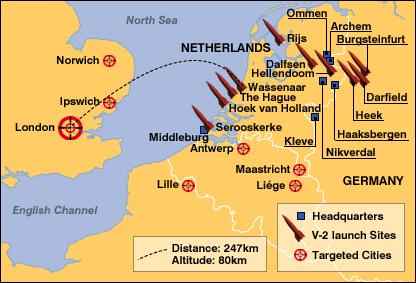
If the bombardment of London became a serious nuisance and great rockets with far-reaching and devastating effect fell on many centers of Government and labor, I should be prepared to do anything that would hit the enemy in a murderous place. I may certainly have to ask you to support me in using poison gas. We could drench the cities of the Ruhr and many other cities in Germany in such a way that most of the population would be requiring constant medical attention. We could stop all work at the flying bomb starting points. I do not see why we should have the disadvantages of being the gentleman while they have all the advantages of being the cad. There are times when this may be so but not now.
[See: Wunderwaffen: Hitler's Deception and the History of Rocketry.]1945 World War II: B-29 Superfortress bombers attack Japan, using new fire-bombing techniques: "The key development for the bombing of Japan was the B-29, which had an operational range of 3,250 miles (6,019 km); almost 90% of the bombs dropped on the home islands of Japan were delivered by this type of bomber."

Medal of Freedom: US President 'Give Em Hell' Harry Truman signs an order creating the award.
United Nations: Nicaragua becomes the first nation to formally accept the Charter.
Cold War: Operation Overcast begins in Europe, moving Austrian and German scientists and their equipment to the United States. It is later given an equally inane name: Operation Paperclip.
1946 Pogrom: Poland: Forty-two Jews are killed in Kielce, Poland, in a pogrom staged by the Soviets to pressure Jews to leave Poland and to discredit Polish opposition to Soviet takeover. In the immediate postwar period, Soviet terror and chaos will claim 300,000 lives including 1,500 Jews. (THP)
1947 Spandau Prison: From Spandau: The Secret Diaries, by Albert Speer:
Raeder tells me I have a fortunate disposition; I am adjusting to imprisonment more easily than all the others. Even now, he says, after two years I still give the impression of being half-way balanced, which is more than can be said for many of the others. (Speer II)
1963 Cold War: US policymakers express optimism:
In the light of a deepening ideological rift between the Soviet Union and China, U.S. officials express their belief that Russian leader Nikita Khrushchev will seek closer relations with the United States. Unfortunately, the optimism was somewhat misplaced. Although China and the Soviet Union announced a serious split in mid-July 1963, Khrushchev's days in office were numbered.
Edited by Levi Bookin (Copy editor) Click to join 3rdReichStudies Disclaimer: This site includes diverse and controversial materials—such as excerpts from the writings of racists and anti-Semites—so that its readers can learn the nature and extent of hate and anti-Semitic discourse. It is our sincere belief that only the informed citizen can prevail over the ignorance of Racialist "thought." Far from approving these writings, this site condemns racism in all of its forms and manifestations.
levi.bookin@gmail.com










Fair Use Notice: This site may contain copyrighted material the use of which has not always been specifically authorized by the copyright owner. We are making such material available in our efforts to advance understanding of historical, political, human rights, economic, democracy, scientific, environmental, and social justice issues, etc. We believe this constitutes a "fair use" of any such copyrighted material as provided for in section 107 of the US Copyright Law. In accordance with Title 17 U.S.C. Section 107, the material on this site is distributed without profit to those who have expressed a prior interest in receiving the included information for research and educational purposes. If you wish to use copyrighted material from this site for purposes of your own that go beyond 'fair use', you must obtain permission from the copyright owner.
Please Note: The list-owner and moderators of 3rdReichStudies are not responsible for, and do not necessarily approve of, the random ads placed on our pages by our web server. They are, unfortunately, the price one pays for a 'free' website.



